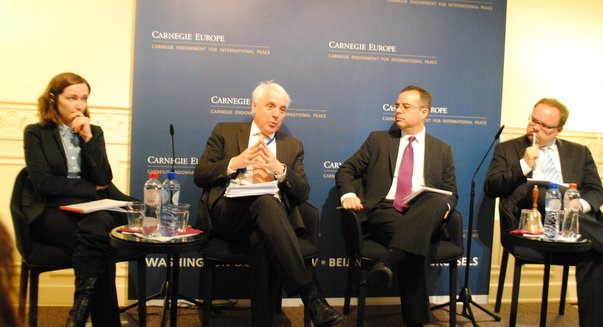Registration
You will receive an email confirming your registration.
IMGXYZ3710IMGZYXThe next years will see most, if not all, of the North Atlantic Treaty Organization’s (NATO) major military operations draw down. The Alliance could find itself, for the first time in twenty years, without a major operation to run. This will bring new challenges as NATO struggles to stay relevant and as its members wrestle with competing priorities.
Jamie Shea, deputy assistant secretary general for Emerging Security Challenges at NATO, Lisa Aronsson, head of the Transatlantic Programme at the Royal United Services Institute, and Carnegie’s Jan Techau discussed these challenges. This event marked the launch of Keeping NATO Relevant, a Carnegie Europe policy outlook written by Jamie Shea. The Financial Times' Peter Spiegel moderated.
Discussion Highlights
- New Challenges Facing NATO: Ahead of the Chicago Summit, Shea outlined two major challenges looming in NATO’s future, both of which, he argued, must be addressed systematically:
- After 2014, NATO could be in a situation where–for the first time since 1949–it is neither planning for or conducting an operation, and has no adversary to focus its planning around. Shea argued that if this happens, it will lead to a major cultural shift in the Alliance.
- Shea warned that NATO also risks a weakening of its interoperability following the end of the International Security Assistance Force in Afghanistan (ISAF) mission.
- After 2014, NATO could be in a situation where–for the first time since 1949–it is neither planning for or conducting an operation, and has no adversary to focus its planning around. Shea argued that if this happens, it will lead to a major cultural shift in the Alliance.
- The Chicago Summit: A Turning Point: Panelists agreed the upcoming Chicago Summit provides an opportunity to redefine the size, mandate, and financial framework for the continuing NATO presence in Afghanistan. Shea insisted that certain “flagship programs”—missile defense, Baltic air policing, and air-to-ground surveillance—should be prioritized in Chicago to highlight how multinational sharing can enable allied capabilities. Furthermore, he added that NATO should use the opportunity in Chicago to lay out a vision of how essential relations can be developed in and beyond operations. Aronsson added that NATO needs to be recast as a coherent strategic security community.
- A Strategic Look Ahead: In the long term, Shea urged that member states must find a way to preserve a standing-start NATO that has enough residual capability to initiate operations quickly, providing the first 50 percent of any military effort. With his “50/50 challenge,” Shea emphasized the importance of a multinational Alliance, highlighting the need to strengthen political confidence among NATO members to form clusters of capability to provide the remaining 50 percent effort, and equitably distribute the costs of operations to the broader NATO community.
- Staying Relevant: Spiegel agreed that, ideally, the NATO secretary general’s “Smart Defense” initiative will transform the Alliance’s mind-set in handling capability development and procurement to achieve a sustainable balance between prioritization, specialization, and collaboration. Techau argued that the flexibility and transparency of its political framework is an indispensable component for maintaining peace and stability in Europe, and is key to NATO’s relevance in the future.
